#Kaoru Kurimoto
Text
Some Guin Saga art dump from my favorite anime that's underrated in the west 😩 (1)
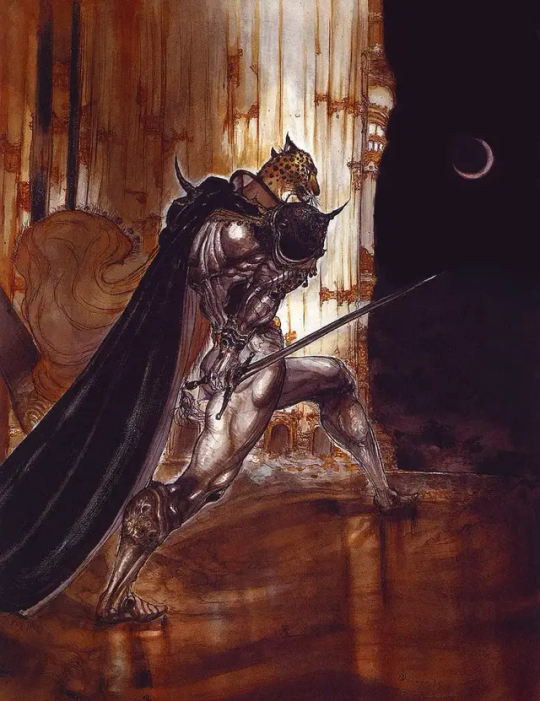
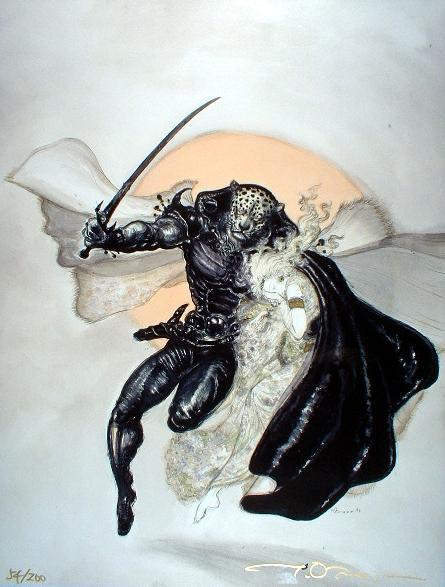

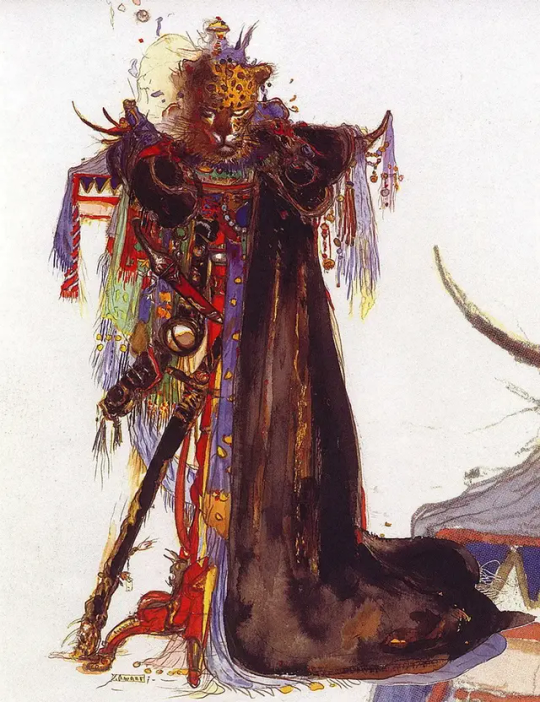
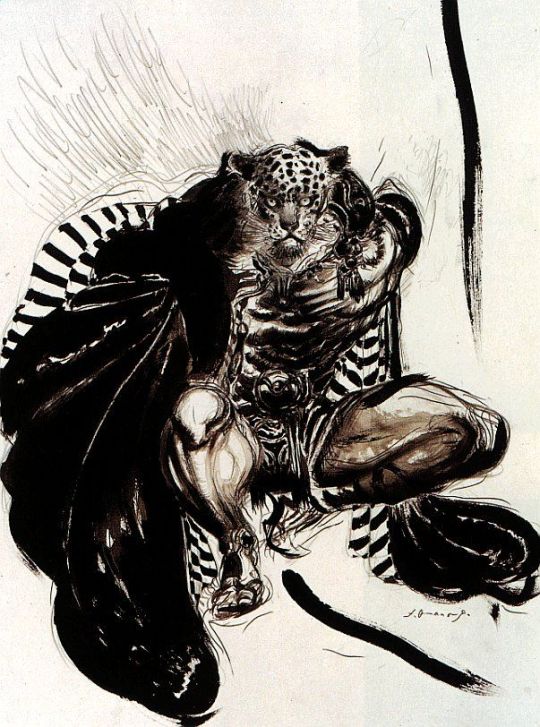
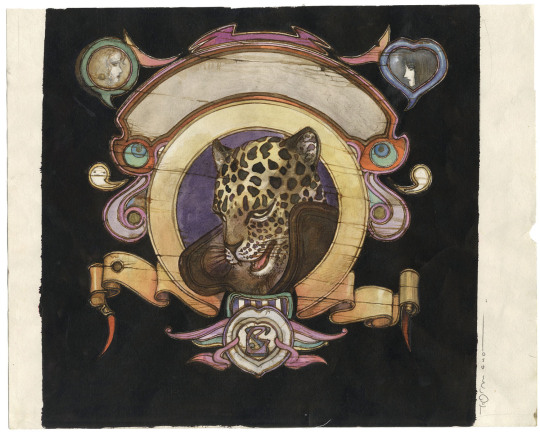


#Guin Saga#Kaoru Kurimoto#yoshitaka amano art#longest novel series in the world#anthro#the literature that inspired Berserk#the leopard mask 🐆
2 notes
·
View notes
Text
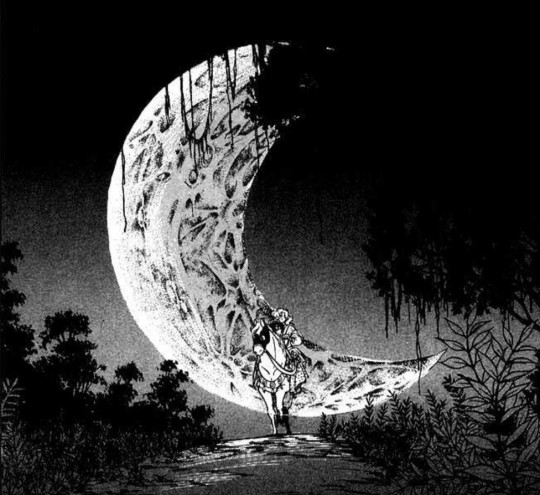
#the sword of Paros#Paros no ken#kaoru kurimoto#yumiko igarashi#yuri#shojo#Well this had a stupid ending but I was enjoying it up until then....#I keep tagging this as yuri just for filing/historical purposes but it is.... questionable if it's yuri
9 notes
·
View notes
Text
Media Thread 2024 - Part 26
The Sword of Paros
Written by Kurimoto Kaoru
Illustrated by Igarashi Yumiko
I feel the passage of time has done this work no favors. The ways in which it discusses gender and sexuality are so muddled that any interpretation doesn't feel quite correct.
The manga completely loses me when one of the main characters, (potentially the only woman in the story depending on interpretation), is sexually assaulted. The plot reasons of why this happens is questionable, considering the impact of the event could have easily been accomplished in a different manner.
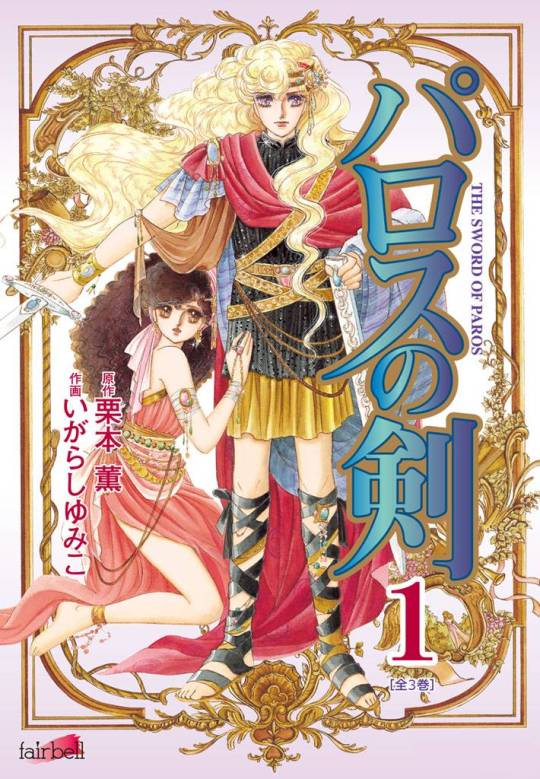
| Full List | Prev | Next |
#media thread 2024#sword of paros#i mean i get that for a manga from 1986 managing a queer narrative of any sort is a feat but i just dont vibe with this#yuri
0 notes
Text

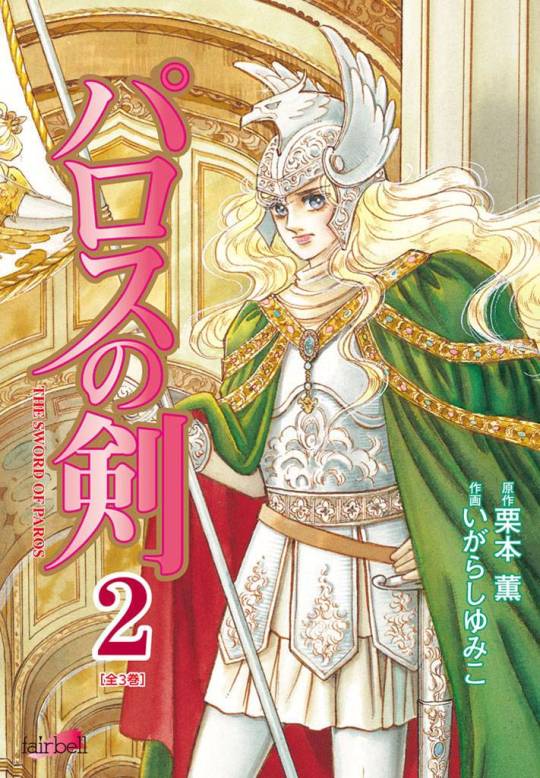
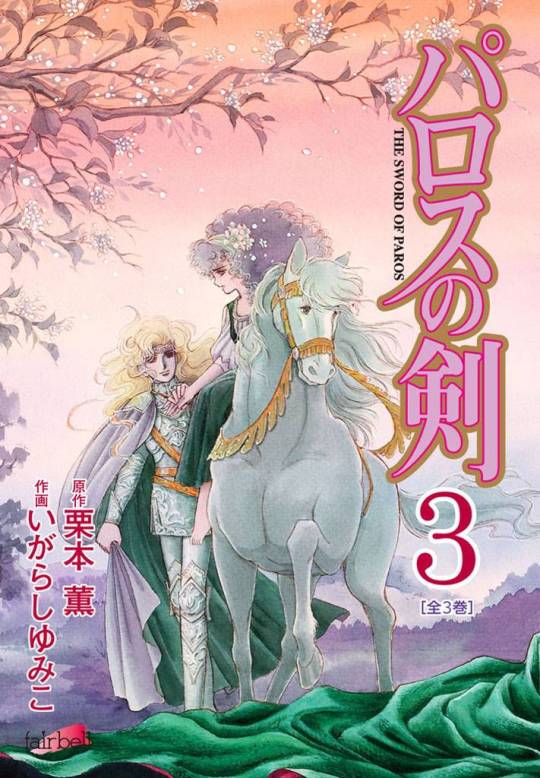
Paros no Ken by Kurimoto Kaoru, Igarashi Yumiko
1 note
·
View note
Photo
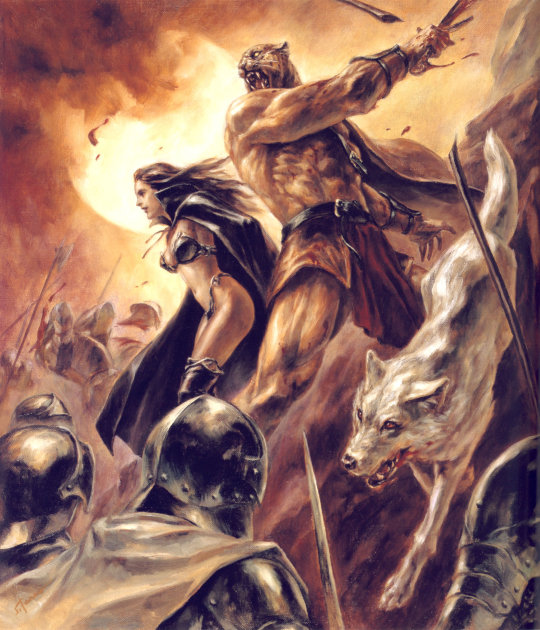
Guin Saga
Art by Shinobu Tanno
57 notes
·
View notes
Photo




Guin Saga 33: Mongohru no Fukkatsu
Illustrated by Yoshitaka Amano
#guin saga#yoshitaka amano#guin saga 33#mongohru no fukkatsu#art#Illustration#kaoru kurimoto#mood#myedit*#edit: misc#dx4
264 notes
·
View notes
Photo


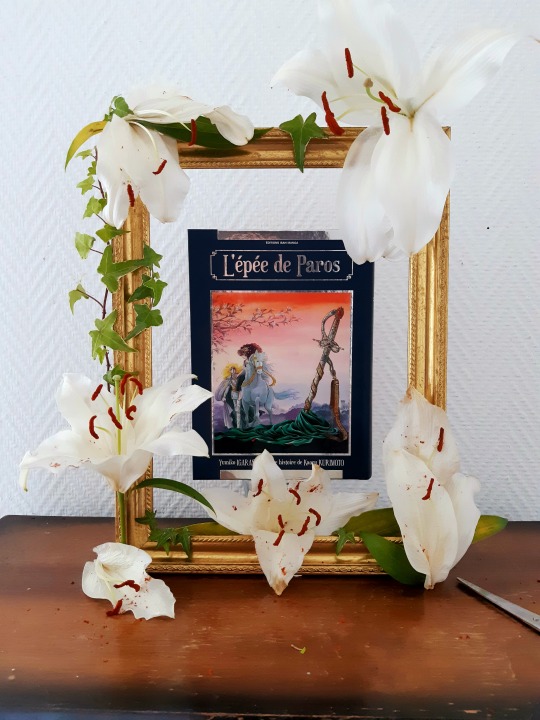
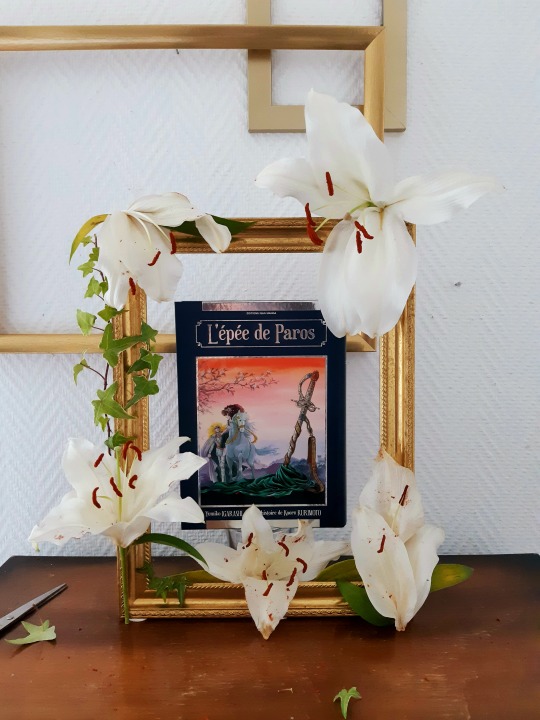

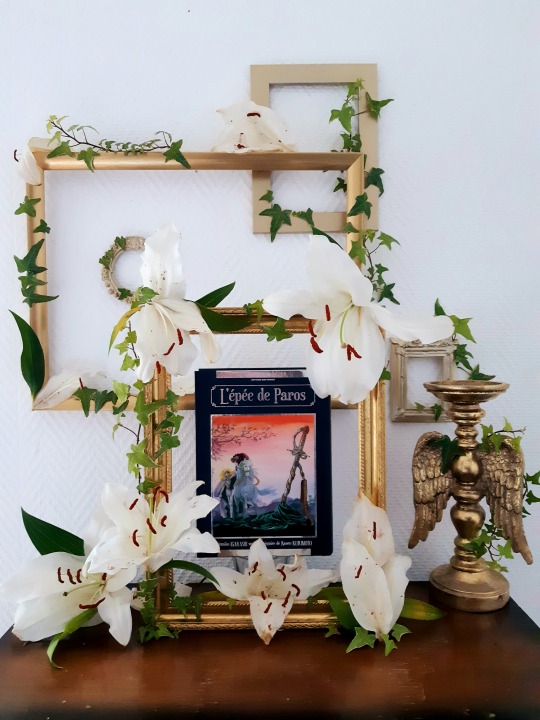
Process of a scenery.
For Paros no Ken by Yumiko Igarashi and Kaoru Kurimoto.
#artnachronisme#artnachronime scenery#paros no ken#scenery#manga#vintage manga#shoujo manga#igarashi yumiko#kaoru kurimoto#baroque#barocco#rococo#lilies
7 notes
·
View notes
Photo
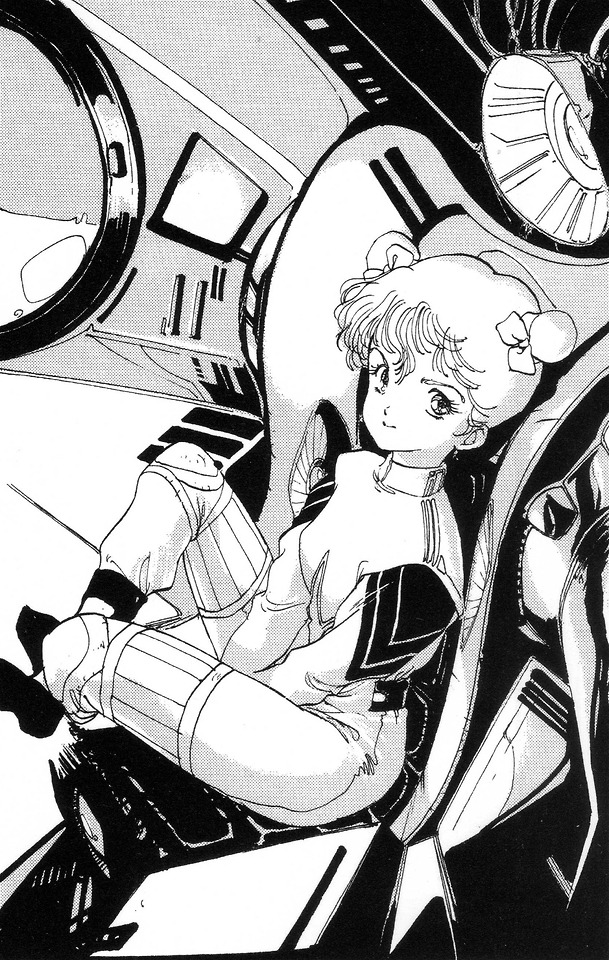



Saraba Ginga (novel) illustrated by Mutsumi Inomata / 1987 (Tsuki no Koe, Hoshi no Yume artbook)
539 notes
·
View notes
Quote
If his men could have seen his young face under his faceplate, or if they could have heard the silent curses rolling off his tongue, they would have realized to their astonishment that their captain, only twenty years of age but already famous and formidable, was crying. Astrias's tears were tears of burning fury. The rage he felt that hour he would never forget for his whole life thereafter.
Kaoru Kurimoto, The Battle of Nospherus
#kaoru kurimoto#the guin saga#the battle of nospherus#light novel#fiction#quote#Sumiyo Imaoka#今岡 純代#astrias#war#soldier#crying#tears#astonishment#burnign fury#manly tears#assuming they exist#anger#angst#famous and formidable#silent curses#tears of burning fury
4 notes
·
View notes
Text
Crying once again cause Guin Saga continues not to be completely translated in english and they're no fan translations of it yet. Not even in spanish 🥲
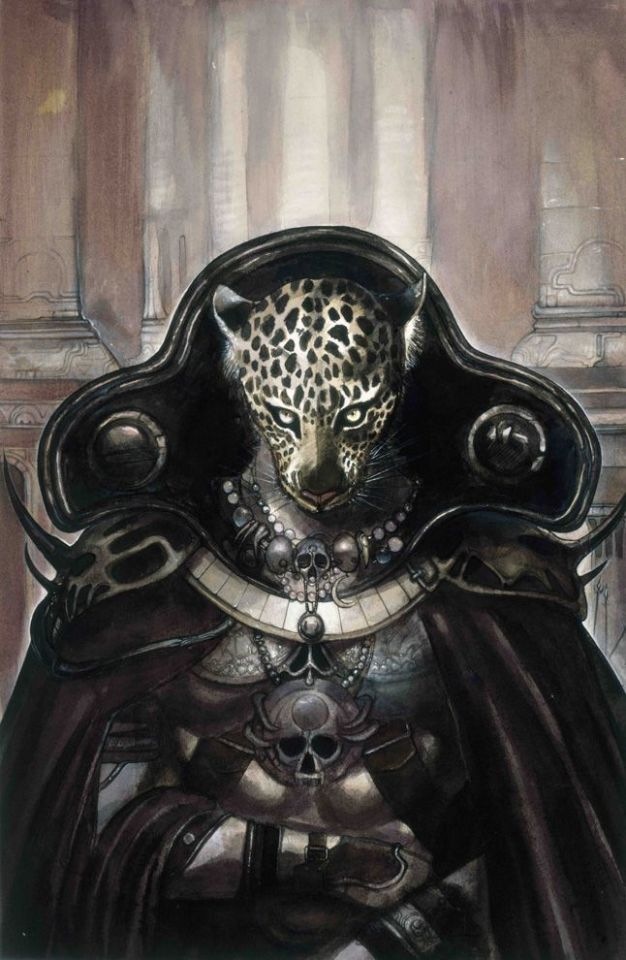

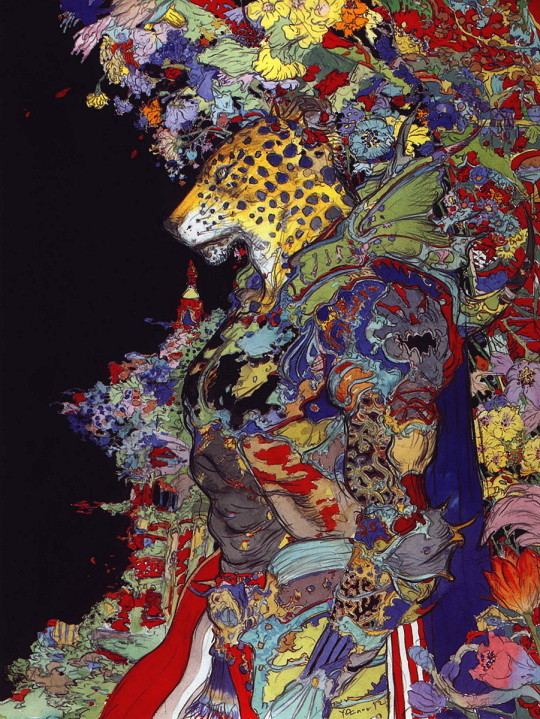





25 notes
·
View notes
Text

#the sword of Paros#Paros no ken#kaoru kurimoto#yumiko igarashi#yuri#shojo#I do like their relationship.....
7 notes
·
View notes
Text
Some Kami no Kohitsuji in June Magazine
The only June issue I own (May 1991) happens to be an issue in which part of KazeKi's sequel novel, Kami no Kohitsuji (神の子羊), was serialized. To be more precise, it has chapters 13-15 from volume I.
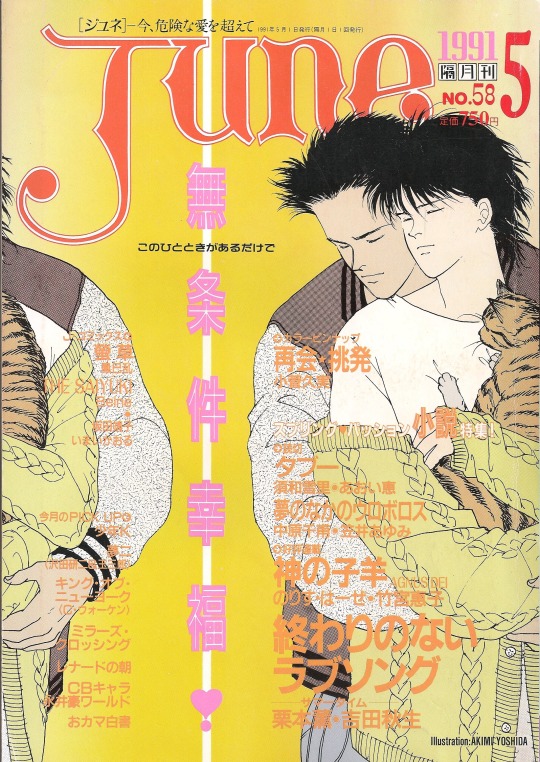
Cover by Yoshida Akimi. She was illustrating another novel that was being serialized at the time, Kurimoto Kaoru's Owari no Nai Love Song (終わりのないラブソング). Is there a database with all the June covers scanned? They look so nice.
I have the Fukkan reprints of the novels. I just wanted to post side-by-side photos of the illustrations. Do you even need a reason to post Takemiya art?


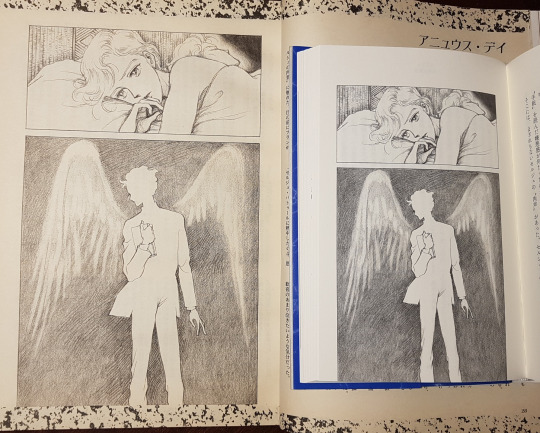
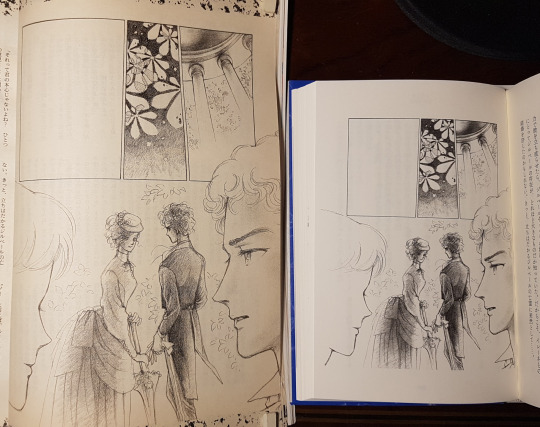
Now I only need courage to actually read these novels.
81 notes
·
View notes
Text
The Freedom of Expression, radio version - Ep 39, June 2016 - Naked living, Tokyo Sports 'Lowlife Awards', Muhammad Ali's death.
Kaoru starts by saying at the time of this broadcast, the band will still be on tour and they will only have two dates at Shinkiba left to do. Joe says he wants to attend the live on June 2nd. This date is also the day of the next broadcast of this show, so he will go to the live, then come home and listen to Dir's new single Utafumi on this show.
Kaoru's first topic relates to a British tv documentary shown on the channel Barcroft TV (now the youtube channel Truly) about a 'naked family'. Kaoru says just the word 'naked' reminds him of the naked old man living on an island in Okinawa, who was visited by Hiranabe. Getting back on track, he continues that the documentary concerns married couple Dave and Diane, who live in Cornwall, UK. This was Diane's 4th marriage, her third being with an abusive man who caused her to see little value in herself. Then she met Dave, who had been interested in naked living since his teens. After being with Dave for two years, Diane has learned to see value in herself again, and has also been happily living naked with him. Kaoru stresses that it seems like they only go naked at home, or at sanctioned places, they are not just walking down the street naked. Both he and Joe wonder about the mentality behind this. They mention the existence of nudist beaches etc. Joe admits that although he usually wears clothes both outside and at home, when he gets stuck writing his manuscripts, he takes a bath to ponder the issue. If he realises the answer to his problem, he will jump out of the bath, and get back to writing, not bothering with clothes. This is slightly different from a naked lifestyle, but it has that same liberating element. Kaoru comments that taking off clothes creates a neutral or 'flat' base. Some people might feel stress from wearing clothes. Joe mentions that the sociologist Kurimoto Shinichiro once said that human beings contain 20% human characteristics and 80% animal characteristics. Joe continues that from the viewpoint of an animal, wearing clothes is pretty odd. Its only humans that do it. In that sense its hard to see whats wrong with naked living. Kaoru agrees, but still thinks we can't all start going naked. Rules around this have developed over time. When you can't even show womens' chests on tv, going naked is a no-no. Joe says, imagine how awful it would be if Hiranabe came to the studio naked? Kaoru finds this pretty unpleasant and asks why Joe had to choose Hiranabe. Joe then brings up writer/actor Shimoda Kageki, who was once gifted a pair of Marylin Monroe print tights from a friend who studied design in New York. He loved the tights so much, he wore them a lot, but was ridiculed for it. His response was to say, 'whats wrong with me wearing something I love?'. Again, its slightly different from living naked, but it shows that what you wear or don't wear shouldn't have to be dicatated by trends. Kaoru repeates the idea that some people might feel stress with clothes, and liberated without them. He then changes the subject a bit to tell a story about one time he went to the toilet in Dir en grey's office. He wanted to use the cubicle, and it was unlocked so he pushed the door open, only to find a staff member in there with pants down. The staff member snapped at Kaoru, 'What are you doing?!' But Kaoru feels he didn't do anything wrong, as the door was unlocked. He didn't want to see a staff member sat on the toilet. Joe says Dir en grey's office sounds pretty interesting.
Next they welcome Tasai for the Tokyo Sports corner, and are slightly disappointed its Tasai and not Hiranabe, because they don't want Hiranabe to be on the show next week when Utafumi is played. Knowing what he is like, they would have preferred him this week so he would not appear on the Utafumi premier show. The song will be played at the end of the show, so any new listeners tuning in the hear the single will be exposed to Hiranabe. Tasai says Hiranabe is probably saving up his energy in preparation. Kaoru says he will cut Hiranabe's mic if he gets too carried away.
Tasai's first news is that Tokyo Sports have announced their own 'Low-life Awards', meaning a list of the most low-life, base stories of the year so far. The number one lowlife story so far is that of the scandal surrounding Tokyo Governer Masuzoe Yōichi. Other stories include the Becky scandal, and the scandal involving Funky Kato's affair. Kaoru mentions that at the time of recording, Masuzoe is still Tokyo Governer, but who knows what will happen. Joe says, the House of Councillors election is approaching, and the LDP/Kōmeitō may be trying to keep thier distance from Masuzoe, but there is still currently no candidate standing to replace him. Tasai speculates whether his ex-wife Katayama Satsuki could stand, or maybe Renho. Joe comments that its a difficult job to do as so many scandals around it get exposed. Masuzoe had been exposed as using public funds for personal luxuries, and one of his claims was for an Italian restaurant which is actually near Tasai's house. Its a family restaurant, which makes Tasai wonder why Masuzoe would claim expenses for this. Masuzoe was also found to have bought a Crayon Shin-chan book with public money, apparently for study. Kaoru thinks he's too stingy. Additionally, despite previously owning the horse that won the Tokyo Derby twice in a row (the horse was sold before his election), he even apparently used public money to buy a discount coupon book for his local area. Kaoru thinks he would probably forget to use the coupons anyway. Tasai thinks there will be a lot more dirty scandals to come in the second half of the year. As for private dirty scandals, Hiranabe would probably win it.
The next story relates to the death of boxer Muhammad Ali. Tasai says he knows and has heard a lot about Ali from wrestler Antonio Inoki, who had a match with Ali in 1976. Joe mentions that Ali appeared on the cover of the U.S. version of Rolling Stone many times, and was well know for his political stances in relation to war and segregation. Tasai then tells a story about Ali that he heard from Inoki. In 1995, Inoki took part in a two day wrestling competition in North Korea, which he also invited Ali to (by this stage his Parkinson's disease was quite advanced). Despite being unable to talk, Ali got up during the event, ran up the stairs and started shadow boxing. He felt some revival of his energy. The following year Ali acted as a torch barer in the 1976 Atlanta Summer Olympics, and according to Inoki it was because of this event in North Korea that Ali regained the energy to be a torch bearer in the Olympics. Tasai then talks a bit about the 1976 fight between Ali and Inoki, which consisted of boxing and pro wrestling in the same fight. Hearing Inoki's story reminds Joe of how Ali was known to believe that nothing is impossible. Joe also mentions the words Ali spoke in his Harvard speech in 1975, also known as the world's shortest poem, 'Me, We'. Tasai asks Kaoru about whether artists need to have a strong sense of will to get through struggles, like Ali had opposing the Vietnam war. He was heavily criticized for his opposition. Kaoru says Dir go by only doing things they like, and if that comes with struggle, then so be it. Its the path they chose, so they must deal with it. Tasai asks if there were any times where people havn't properly understood the band's actions. Kaoru says there is never a time when everything is understood perfectly by everyone. In fact, he prefers not to push specific explanations or meanings about Dir's music. The listeners can use thier own imagination. Tasai links this back the the new song Utafumi, and Kaoru once again repeats his desire for Hiranabe not to be on the show next week.
To finish, Kaoru plus the new jingle campaign, Budokan DVD, and tour, and reminds listeners to tune in next week for a first listen of the new single.
Songs - Dir en grey/Shokubeni
12 notes
·
View notes
Text

Leda (SF novel by Kaoru Kurimoto) - illustrations by Mutsumi Inomata / 1988 (Tsuki no Koe, Hoshi no Yume artbook)
16 notes
·
View notes
Photo
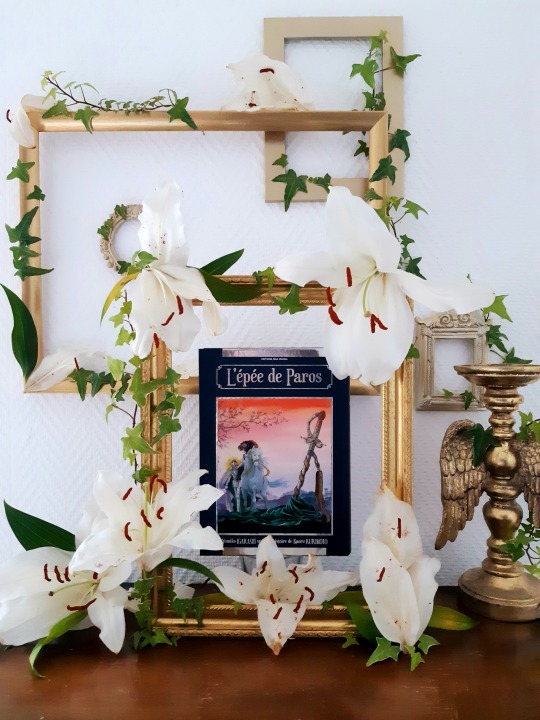
Scenery for Paros no Ken by Yumiko Igarashi and Kaoru Kurimoto.
#artnachronisme#artnachronisme through the days#artnachronisme journal#baroque#barocco#vintage#rococo#vintage manga#LGBTQ+#l'épée de paros#the sword of paros#paros no ken#yumiko igarashi#kaoru kurimoto#ancient#antique#interior#manga scenery#scenery#artnachronime scenery
5 notes
·
View notes
Photo
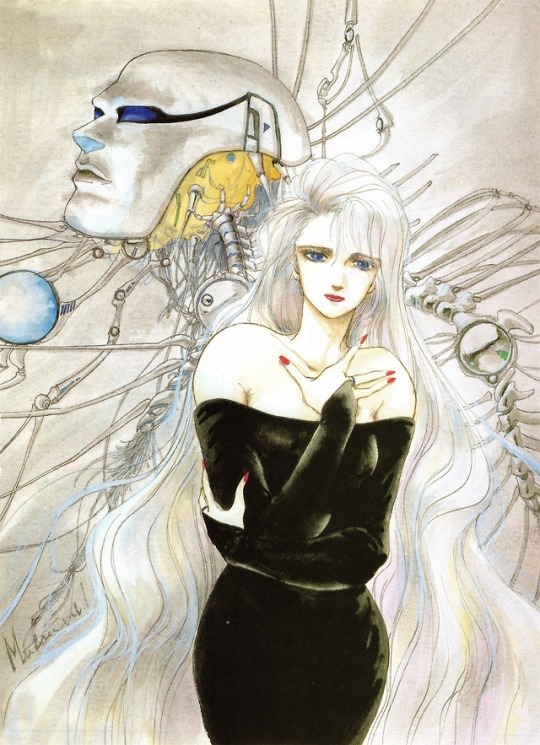
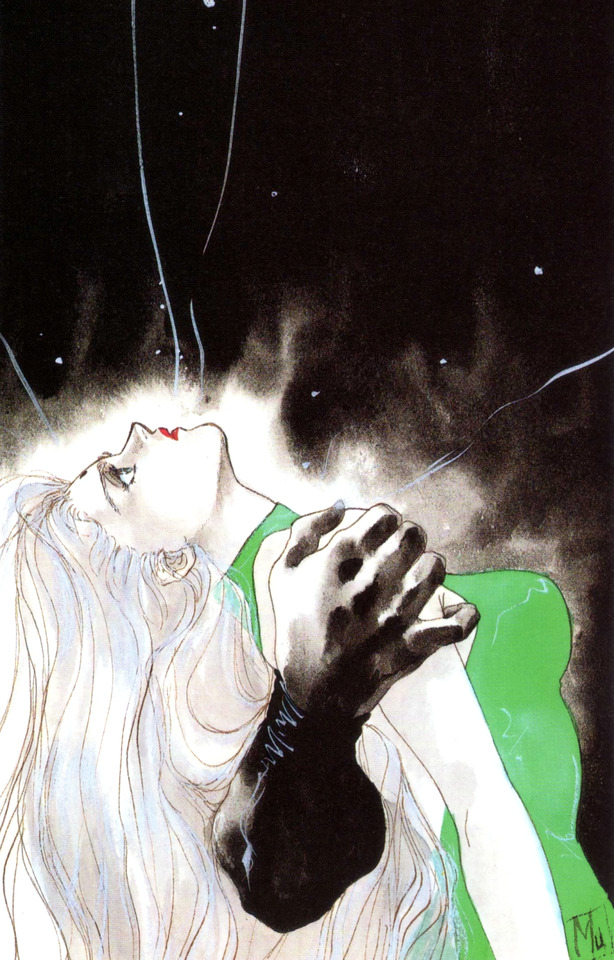

Saraba Ginga (SF novel by Kaoru Kurimoto) illustrated by Mutsumi Inomata / 1987 (Tsuki no Koe, Hoshi no Yume artbook)
286 notes
·
View notes